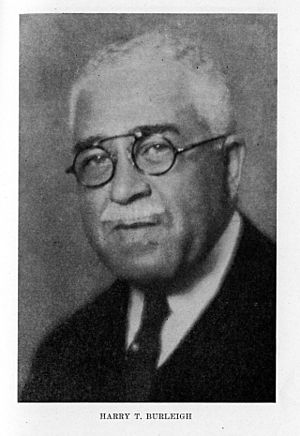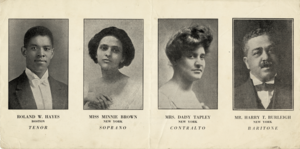Harry Burleigh facts for kids
Quick facts for kids
Harry Burleigh
|
|
|---|---|
 |
|
| Background information | |
| Birth name | Henry Thacker Burleigh |
| Born | December 2, 1866 Erie, Pennsylvania, U.S. |
| Died | September 12, 1949 (aged 82) Stamford, Connecticut, U.S. |
| Occupation(s) | Singer, composer, arranger |
Henry Thacker ("Harry") Burleigh (born December 2, 1866 – died September 12, 1949) was an American classical composer, arranger, and professional singer. He had a rich baritone voice.
Burleigh was the first Black composer to help create a unique American music style. He made Black music available to classical musicians. He did this by introducing them to spirituals (religious folk songs) and by arranging these songs for classical performances.
He also introduced the famous composer Antonín Dvořák to Black American music. This greatly influenced some of Dvořák's most well-known pieces. Dvořák even said that Black music would be the foundation of American classical music.
Contents
Early Life and Family
Henry Thacker Burleigh was born in Erie, Pennsylvania, in 1866. His mother was Elizabeth Burleigh, and his father was Henry Thacker.
His grandfather, Hamilton Waters, was freed from slavery in 1832. He paid $55 for his freedom and his mother's. After gaining his freedom, he traveled to Ithaca, New York. Later, he moved to Erie, Pennsylvania, where Burleigh's mother, Elizabeth, was born.
Elizabeth graduated from Avery College in Pittsburgh in 1855. She was not allowed to teach in Erie's public schools because of her race. However, she taught at the Colored School for many years.
Burleigh's father, Henry Thacker Burleigh Sr., fought in the American Civil War. He was the first Black person to serve on a jury in Erie County in 1871. After his father died in 1873, his mother remarried. Her second husband, John Elmendorf, also served in the Union Navy.
Burleigh's grandfather was known for his beautiful voice. He taught young Harry and his brother Reginald traditional spirituals and slave songs.
To help his family, Burleigh took on many different jobs. He lit gas streetlamps, sold newspapers, and worked as a printer's devil (an apprentice). He also worked as a coachman and a steward on Lake Erie steamboats. While in high school, he studied to be an accountant at Clark's Business College.
His mother sometimes worked as a maid for the daughter of his father's employer. This woman held musical gatherings called musicales at her home. Burleigh worked as a doorman when famous musicians performed there. These musicians included Venezuelan pianist Teresa Carreño and Italian tenor Italo Campanini.
He also studied singing with George F. Brierly. During and after high school, Burleigh became known as one of Erie's best classical singers. He sang as a soloist for several churches and the Jewish synagogue in Erie. He also performed at many community events.
Studying Music in New York
At age 26, Burleigh was accepted into the famous National Conservatory of Music of America in New York. He received a scholarship to attend. Frances MacDowell, the mother of composer Edward MacDowell, helped him get this scholarship. Burleigh later played the double bass in the Conservatory's orchestra.
At first, the Conservatory denied Burleigh the scholarship he needed. They said his audition was just below their standards. But Mrs. MacDowell, who was the registrar, insisted he be allowed to try again. Days later, he received the scholarship.
How Burleigh Influenced Dvořák
To support himself while studying, Burleigh worked for Mrs. MacDowell as a handyman. He cleaned and did other tasks she needed. It is said that Burleigh, who became famous for his baritone voice, sang spirituals while cleaning the Conservatory's halls. This caught the attention of the Conservatory's director, Czech composer Antonín Dvořák. Dvořák asked Burleigh to sing for him.
Burleigh later said: "I sang our Negro songs for him very often. Before he wrote his own themes, he filled himself with the spirit of the old Spirituals." Dvořák himself said: "In the negro melodies of America I discover all that is needed for a great and noble school of music."
Dvořák used what he called "Negro melodies" and Native American music. He adopted the Pentatonic scale, which is a musical scale with five notes. This scale appears in his Symphony "From the New World" and his "American" String Quartet. In the Symphony, a flute melody sounds like the spiritual "Swing Low, Sweet Chariot". This might have been one of the songs Burleigh sang to Dvořák.
In 1893, Burleigh helped Dvořák by copying out the instrumental parts for the symphony. The next year, Burleigh sang in Dvořák's arrangement of Stephen C. Foster's classic Old Folks at Home. Burleigh graduated in 1896 and later taught at the Conservatory.
Singing Career
Burleigh started his singing career as the baritone in his family's quartet. By the time he left Erie in 1892, he was singing with the city's best vocalists. He performed at civic events and church gatherings.
In 1894, he became a soloist for St. George's Episcopal Church in New York City. Some people at the church did not want to hire Burleigh because he was Black. This was at a time when other white churches in New York did not allow Black people to worship. J. P. Morgan, a powerful member of St. George's, cast the deciding vote to hire Burleigh.
Despite these early challenges, Burleigh became close to many church members. He stayed in this position for 52 years, retiring in 1946. He helped start the church's tradition of an annual Spirituals service every May. His singing of "The Palms" by Jean-Baptiste Faure was a Palm Sunday tradition for 50 years. In 1944, New York Mayor La Guardia even arranged a radio broadcast of his performance.
In the late 1890s, Burleigh became known as a concert soloist. He sang art songs, opera selections, and African-American folk songs. He performed for King Edward VII in London in 1908. From 1900 to 1925, Burleigh was also a member of the synagogue choir at the Temple Emanu-El in New York. He was the only African-American to sing there.
Burleigh did not like making recordings of his voice. For a long time, people thought no recordings existed. He did record once in 1919 for a small label run by his friend George Broome. He also recorded in 1944 for St. George's Church. The 1919 recording still exists, but the later recordings have not been found.
Musical Arrangements and Compositions
In the late 1890s, Burleigh began to publish his own arrangements of art songs. Around 1898, he started composing his own songs. By the late 1910s, Burleigh was one of America's most famous composers of art songs. Around 1910, Burleigh also worked as a music editor for G. Ricordi, an Italian music publisher in New York.
Burleigh published several versions of the Negro spiritual "Deep River" in 1916 and 1917. He quickly became famous for his arrangements of spirituals for voice and piano. His arrangements helped make spirituals a popular type of music for concert singers. Within a few years, many famous singers performed Burleigh's arrangements.
Burleigh's arrangements of spirituals and sentimental songs were very popular in the late 1910s and 1920s. Almost every singer performing in a major city would include his songs in their concerts. John McCormack sang several of Burleigh's songs, including "Little Mother of Mine" (1917) and "Dear Old Pal of Mine" (1918). The popularity of Burleigh's music led to a huge increase in the popularity of spirituals during the 1920s. He also set some poems by Walt Whitman to music and published music for piano and violin.
It is estimated that Burleigh wrote between 200 and 300 original songs. In 1914, he helped create the American Society of Composers, Authors, and Publishers (ASCAP). He became a member of its board of directors in 1941.
Later Life and Legacy
Throughout the 1920s and 1930s, Burleigh continued to promote spirituals. He did this through publications, lectures, and new arrangements. His dedication to spirituals became even more famous than his singing career or his art song arrangements.
He retired in 1946 due to poor health. His son moved him to a retirement home in Stamford, Connecticut. He died there on September 12, 1949, at age 82, from heart failure. More than 2,000 people attended his funeral at St. George's Church. Famous musicians like Hall Johnson, Noble Sissle, Eubie Blake, William C. Handy, and Cameron White were among the pallbearers. His body was returned to Erie, Pennsylvania, for burial.
Many African-American soloists, such as Roland Hayes, Marian Anderson, and Paul Robeson, became successful. Burleigh had coached many of them. His important role in helping Black soloists perform on America's stages seemed to be forgotten for a while. Many of his popular art songs from the early 1900s have been out of print since his death. However, he is still considered one of America's most important composers from that time.
In 1917, Burleigh received the Spingarn Medal. This award is given annually by the National Association for the Advancement of Colored People (NAACP) for outstanding achievements by an African American. He also received honorary degrees from Howard University and Atlanta University.
In 2008, an album of his works called Nobody Knows: Songs of Harry T. Burleigh was released. It was performed by Karen Parks. The album reached No. 2 on Billboard′s Traditional Classical Album Chart.
His arrangements are still used today. For example, his work is included in the 1982 Hymnal of the Episcopal Church (United States), such as hymn No. 529 ("In Christ there is no East or West"). Other arrangements are in alternative hymnals, including Lift Every Voice and Sing.
In 2019, a committee began working to name a street after Harry T. Burleigh. The NYC Council Member Carlina Rivera submitted the application, and it was approved. The ceremony for "Harry T. Burleigh Place" was held on September 12, 2021, in Manhattan. In October 2021, U.S. Representative Carolyn B. Maloney officially recognized the celebration of Henry Thacker "Harry" Burleigh in the Congressional Record.
Selected Musical Works
For Violin and Piano
- Six Plantation Melodies for Violin and Piano (1901)
- Southland Sketches (1916)
For Piano
- From the Southland (1910)
Art Songs
- "Just Awearyin' for You", words by Frank Lebby Stanton (1894)
- "Waiting" (poem by Martha Dickinson Bianchi, 1904)
- "I Love My Jean" (Robert Burns poem, 1914)
- "Jean" (1914), words by Frank Lebby Stanton
- "Saracen Songs" (1914)
- "The Prayer" (1915)
- "The Young Warrior" (poem by James Weldon Johnson, 1916)
- "Ethiopia Saluting the Colors" (poem by Walt Whitman, 1916)
- "Little Mother of Mine" (1917)
- "Sailor's Wife" (1917)
- "Dear Old Pal of Mine" (1918)
- "Under a Blazing Star" (1918)
- "In the Great Somewhere" (1919)
- "Five Songs" (poems by Laurence Hope, 1919)
- "Lovely Dark and Lonely One" (poem by Langston Hughes, 1935)
 | Leon Lynch |
 | Milton P. Webster |
 | Ferdinand Smith |





